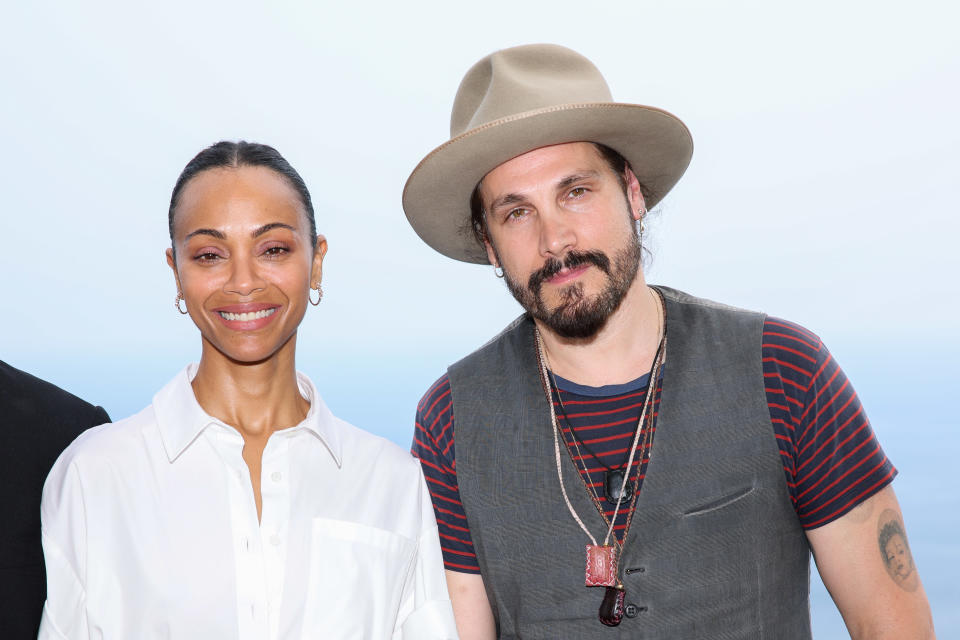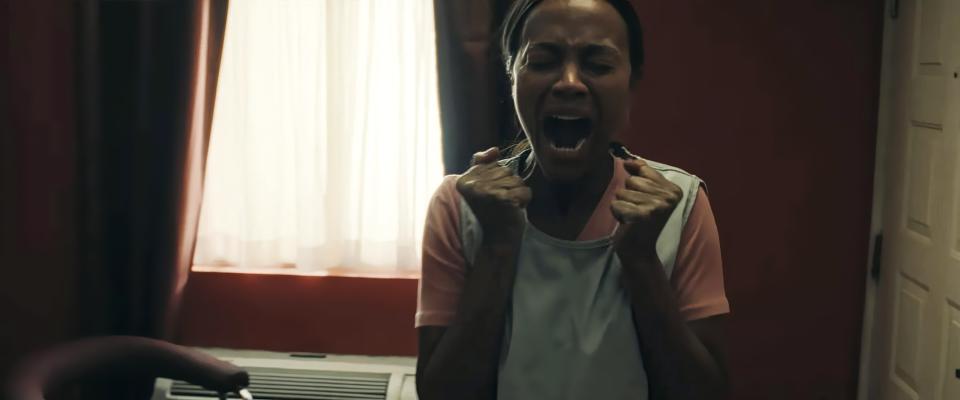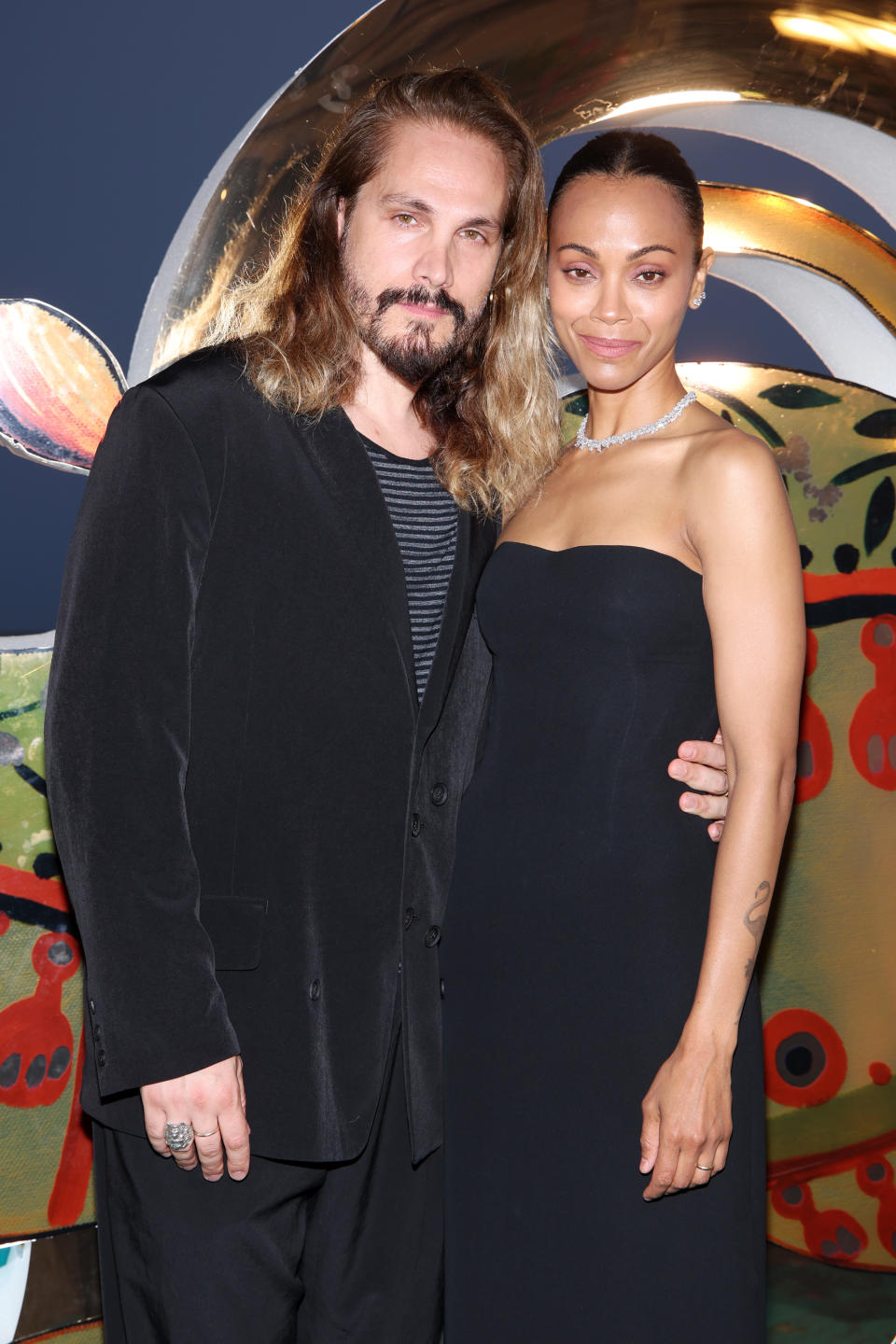Marco Perego-Saldaña & Zoe Saldaña On Their Hope ‘The Absence Of Eden’ Will “Open Conversation” About The U.S. Border Crisis

If Italian artist Marco Perego-Saldaña’s transition to film comes as a surprise, it is only to those outside his own household. “I always wanted to make a film. I’m a little obsessed. I watch one film Monday to Friday,” he says. “Sunday, actually,” corrects his wife Zoe Saldaña, with a laugh.
With the intensely dark drama The Absence of Eden starring Saldaña and Garrett Hedlund as individuals on each side of the U.S. border crisis, Perego-Saldana has put decades of artistry and independent study to use, creating a film that juxtaposes beauty with brutality. “The idea was to approach it from a sculpture perspective,” he says. “There are so many mysteries inside the picture to discover, if people pay attention.”
More from Deadline
DEADLINE: Why was this a subject matter that you wanted to explore with your first feature film?
MARCO PEREGO-SALDAÑA: I’m an artist. I do installation and sculpture for a living, and in 2016 I did this piece where 714 children go from Syria to Italy. I collected 714 pairs of shoes and filled them with concrete. I felt, at the time, maybe if I was using another tool, like cinema, I can be impactful [and maybe evoke] more conversation. Zoe and I, it’s part of our core values from an artist perspective to create conversations about humanity.

DEADLINE: Zoe, how does the refugee crisis resonate with you?
ZOE SALDAÑA: I think refugee crises have become a global conversation, whether it’s because it’s an ongoing matter in every nation, or how our access through social media makes us much more aware of it. Like Marco said, [it’s about] reminding ourselves and others that we’re talking about people. I’m a daughter of immigrants. My grandmother arrived in New York in 1961. She was born and raised under a dictatorship in Dominican Republic. My grandmother really felt freedom in New York. She worked so hard and the moment she became a citizen, my grandmother voted, always paid her taxes and taught us the value of America and what it meant to her — and therefore what it should mean to us and what we should pass down to our children. But your personal story with immigration is not the same as everybody else’s, and I was always curious to understand everybody’s journey. You discover all the layers of this complex conversation.
DEADLINE: Marco, how do you feel your career so far prepared you for this moment?
PEREGO-SALDAÑA: I love cinema, I really do. I spend so much time watching film. I have a lot of conversations with Zoe. We really love this form of art and I think this film is an accumulation of experience. Zoe had a very big point: I think for us, it was not about making a political film, it was about making a movie about humanity. And I love that you used the words intense, because, I think, the truth of the people that have this journey, this experience, is this intensity and feeling under pressure all the time. I’m very grateful that’s the impact on you. That was the conversation for us — again, not in making a political film, but about making a film to open conversation.
SALDAÑA: And it’s not so black and white. For example, Garrett Hedlund’s character, an ICE agent, we get to experience it through his eyes as well. That’s a part of the conversation that we’ve never really had — the humanity from these individuals that put their uniform on. They have a duty to fulfill, but we never stop to ask ourselves, “Are they in concurrence with this? Does this conflict with their core values?” And the answer is yes. We’ve met agents that choose to be anonymous, obviously, but they feel terrible. They’re human beings, they’re decent people, and every day they wake up and they’re arresting women and children and sending them back. They’re witnessing things that are just horrible and unimaginable and they have to live with this. It’s very difficult for them as well.

DEADLINE: Zoe, how did you come to play lead character?
SALDAÑA: My husband’s the director. It’s really as simple as that (laughs). I was very grateful. It’s a difficult role. It demands work and commitment. You can’t just phone this in. Being that I’m the wife of the writer, producer and director, it was on me to make sure that I didn’t let Marco down. Just because he was my husband, it didn’t mean that everything was going to be easier to me. This was a very difficult character to get into. It was also during a very difficult time in our lives, because our children were so young. This is in 2019. It took Marco two years to put this movie together. A month before we began to shoot — Marco was already in pre-production — my grandmother unfortunately passed away. This movie was about stories like hers, so it was difficult — but that meant that I really needed to be all in and understand it.
DEADLINE: What attracted you to the role, other than being able to work with your husband?
SALDAÑA: Esmeralda felt, to me, like the kind of person that if there was a kid that was thirsty, she would share her water with her. If there was a mother that would look at her and say, “Give me your word, take care of my kids,” she would keep her word. If she’s been offered to be a part of a crime, she says no. I’m like, “Oh God, this is the kind of woman that I am. These are the kind of choices that I would make for the betterment of my life.” Or, if I was in a great deal of desperation, I feel like this is what I would do. I didn’t see her as an illegal immigrant. I didn’t see her as a victim. I just saw her as a decent person.
DEADLINE: I imagine it’s a very raw experience. This character, she’s almost wearing her skin inside out. Is it easier or more difficult to do that with a spouse?
SALDAÑA: The fact that Marco and I are partners in every sense of the word makes it so safe and so enjoyable. There is no anxiety. I don’t have to impress him. Marco also knows how to be straightforward with me, because he knows how I am. He knows how, one, I can take it. I’m a big girl. He knows my endurance, my level of determination. But, also, he knows how sensitive I am. There’s this shorthand that we have where we’re able to create a playground for each other, and it’s just, beginning to end, so safe. There’s nothing easy about playing a character like this. It’s fucking hard. You’re getting to witness a lot of pain. And the challenge about that is, what do you do without making it melodramatic? I’m a very tough critic on myself, and there’s always the should’ve, could’ve, would’ve, which is why it’s hard for me to watch myself in anything that I do. I needed to lean into Marco a lot, because he was the composer and he was going to be keeping that balance.
DEADLINE: How was the experience for you?
PEREGO-SALDAÑA: When I saw how vulnerable Zoe was and how there were layers to what she could present in a character, I saw Zoe in a more raw way. From my perspective, I think it was an incredible gift that actors can give to a first-time director, to any director. I felt incredible about what Zoe pulled off. This vulnerability, I never see this raw Zoe, this naked character. And very honest. I also think Garrett did an incredible job.

DEADLINE: What does Garrett bring to a role like this?
SALDAÑA: What Garrett represents is this immediate idea of an American law enforcement agent who is here to straighten things out and make everything feel OK. But what happens when that person lives in complete turmoil and conflict?
PEREGO-SALDAÑA: I know Garrett, because he’s been very close to Zoe for years and he’s absolutely an incredible friend. I want to find the right words, because the conflict [we see within him] and the conflict he has on the screen, I think it was such a spiritual vulnerability I see from Garrett. The [contradiction] of his internal conflict and the external world, that was something that really attracted me to having Garrett play this role, and I was very grateful.
DEADLINE: There are some beautiful scenes in this film that are juxtaposed with some real brutality. What did you want to achieve by that?
PEREGO-SALDAÑA: The idea was to really juxtaposition this idea of life where there is incredible dignity, humanity and so much pain. That’s what I tried to achieve. I really like this type of a beauty aspect, where, after that, there is a deepness of conversation inside.
Best of Deadline
Hollywood & Media Deaths In 2024: Photo Gallery & Obituaries
2024 Premiere Dates For New & Returning Series On Broadcast, Cable & Streaming
Sign up for Deadline's Newsletter. For the latest news, follow us on Facebook, Twitter, and Instagram.

 Yahoo News
Yahoo News 
